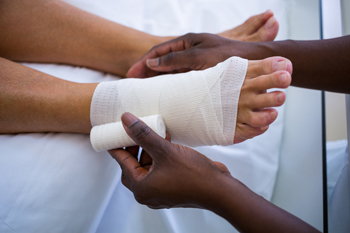
Dr. Kenneth Rosenthal
Dr. Jonathan C. O’Quinn
Dr. Michael J. Price

Dr. Kenneth Rosenthal
Dr. Jonathan C. O’Quinn
Dr. Michael J. Price
 Many diabetic patients are aware of the importance of promptly treating existing foot wounds. There may be serious complications if foot wounds are not treated, which may cause pain and discomfort. Some of the wounds on the feet that can be dangerous to the health of a diabetic patient can include cuts, blisters, or severely dry skin that may result in cracked heels. There are noticeable signs an infection may have developed. These can consist of extreme pain, swelling, and pus may appear surrounding the affected area. Additionally, some patients may experience a high temperature, swollen glands, or a general feeling of being unwell. If you have wounds on your feet, it is strongly advised that you are under the care of a podiatrist who can treat existing wounds.
Many diabetic patients are aware of the importance of promptly treating existing foot wounds. There may be serious complications if foot wounds are not treated, which may cause pain and discomfort. Some of the wounds on the feet that can be dangerous to the health of a diabetic patient can include cuts, blisters, or severely dry skin that may result in cracked heels. There are noticeable signs an infection may have developed. These can consist of extreme pain, swelling, and pus may appear surrounding the affected area. Additionally, some patients may experience a high temperature, swollen glands, or a general feeling of being unwell. If you have wounds on your feet, it is strongly advised that you are under the care of a podiatrist who can treat existing wounds.
Wound care is an important part in dealing with diabetes. If you have diabetes and a foot wound or would like more information about wound care for diabetics, consult with one of our podiatrists from Eastern Carolina Foot & Ankle Specialists. Our doctors will assess your condition and provide you with quality foot and ankle treatment.
What Is Wound Care?
Wound care is the practice of taking proper care of a wound. This can range from the smallest to the largest of wounds. While everyone can benefit from proper wound care, it is much more important for diabetics. Diabetics often suffer from poor blood circulation which causes wounds to heal much slower than they would in a non-diabetic.
What Is the Importance of Wound Care?
While it may not seem apparent with small ulcers on the foot, for diabetics, any size ulcer can become infected. Diabetics often also suffer from neuropathy, or nerve loss. This means they might not even feel when they have an ulcer on their foot. If the wound becomes severely infected, amputation may be necessary. Therefore, it is of the upmost importance to properly care for any and all foot wounds.
How to Care for Wounds
The best way to care for foot wounds is to prevent them. For diabetics, this means daily inspections of the feet for any signs of abnormalities or ulcers. It is also recommended to see a podiatrist several times a year for a foot inspection. If you do have an ulcer, run the wound under water to clear dirt from the wound; then apply antibiotic ointment to the wound and cover with a bandage. Bandages should be changed daily and keeping pressure off the wound is smart. It is advised to see a podiatrist, who can keep an eye on it.
If you have any questions, please feel free to contact our office located in Greenville, NC . We offer the newest diagnostic and treatment technologies for all your foot care needs.